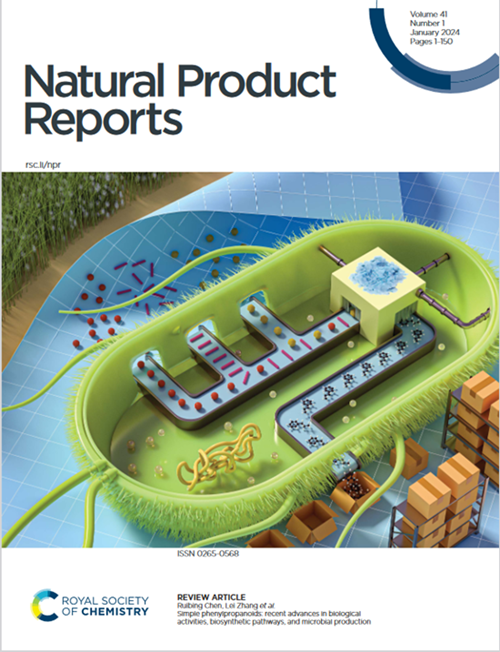Harnessing microbial co-culture to increase the production of known secondary metabolites†
IF 10.6
1区 化学
Q1 BIOCHEMISTRY & MOLECULAR BIOLOGY
引用次数: 0
Abstract
Covering: 2019 to 2024
Secondary metabolites (SMs) are naturally occurring defense or signaling molecules that are also utilized as human and animal drugs, crop protection agents, and fine chemicals. Currently, SMs are primarily produced in monoculture settings, devoid of the intricate microbial interactions found in natural environments. Monoculture may lead to the silencing of gene clusters, requiring various genetic or bioprocess strategies to activate the biosynthesis of the corresponding metabolites. Less considered is the effect of monoculture on the efficiency of the production of important, known SMs during microbial fermentations. Co-culturing aims to mimic the complexity of natural microbial habitats, thus may increase the titer, the rate and/or the yield of fermentations. This review summarizes the progress in utilizing co-culture to promote the synthesis of known SMs by describing the types of various microbial co-cultures, listing the mechanisms for enhancing the biosynthesis of SMs, and navigating the challenges and strategies for applying such an approach in the biotechnology industries.

利用微生物共培养来增加已知次生代谢物的产量。
次生代谢物(SMs)是天然存在的防御或信号分子,也被用作人类和动物药物、作物保护剂和精细化学品。目前,SMs主要是在单一栽培环境中产生的,缺乏在自然环境中发现的复杂的微生物相互作用。单一栽培可能导致基因簇的沉默,需要各种遗传或生物过程策略来激活相应代谢物的生物合成。较少考虑的是单一培养对微生物发酵过程中重要的已知SMs生产效率的影响。共培养旨在模拟自然微生物栖息地的复杂性,从而可以提高滴度,速率和/或发酵产量。本文综述了利用共培养促进已知短粒微生物合成的进展,阐述了各种微生物共培养的类型,列出了促进短粒微生物合成的机制,以及在生物技术行业应用这种方法所面临的挑战和策略。
本文章由计算机程序翻译,如有差异,请以英文原文为准。
求助全文
约1分钟内获得全文
求助全文
来源期刊

Natural Product Reports
化学-生化与分子生物学
CiteScore
21.20
自引率
3.40%
发文量
127
审稿时长
1.7 months
期刊介绍:
Natural Product Reports (NPR) serves as a pivotal critical review journal propelling advancements in all facets of natural products research, encompassing isolation, structural and stereochemical determination, biosynthesis, biological activity, and synthesis.
With a broad scope, NPR extends its influence into the wider bioinorganic, bioorganic, and chemical biology communities. Covering areas such as enzymology, nucleic acids, genetics, chemical ecology, carbohydrates, primary and secondary metabolism, and analytical techniques, the journal provides insightful articles focusing on key developments shaping the field, rather than offering exhaustive overviews of all results.
NPR encourages authors to infuse their perspectives on developments, trends, and future directions, fostering a dynamic exchange of ideas within the natural products research community.
 求助内容:
求助内容: 应助结果提醒方式:
应助结果提醒方式:


